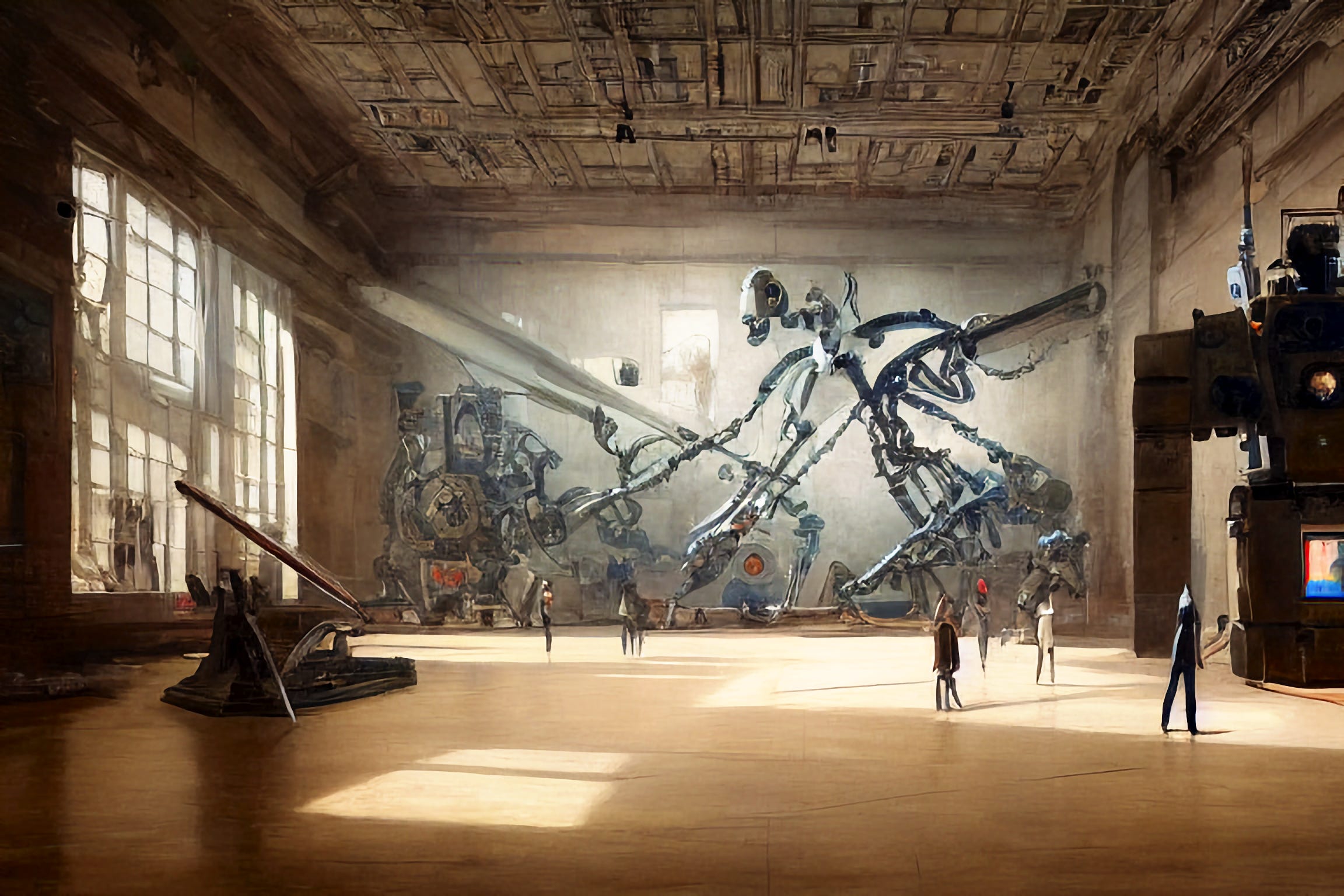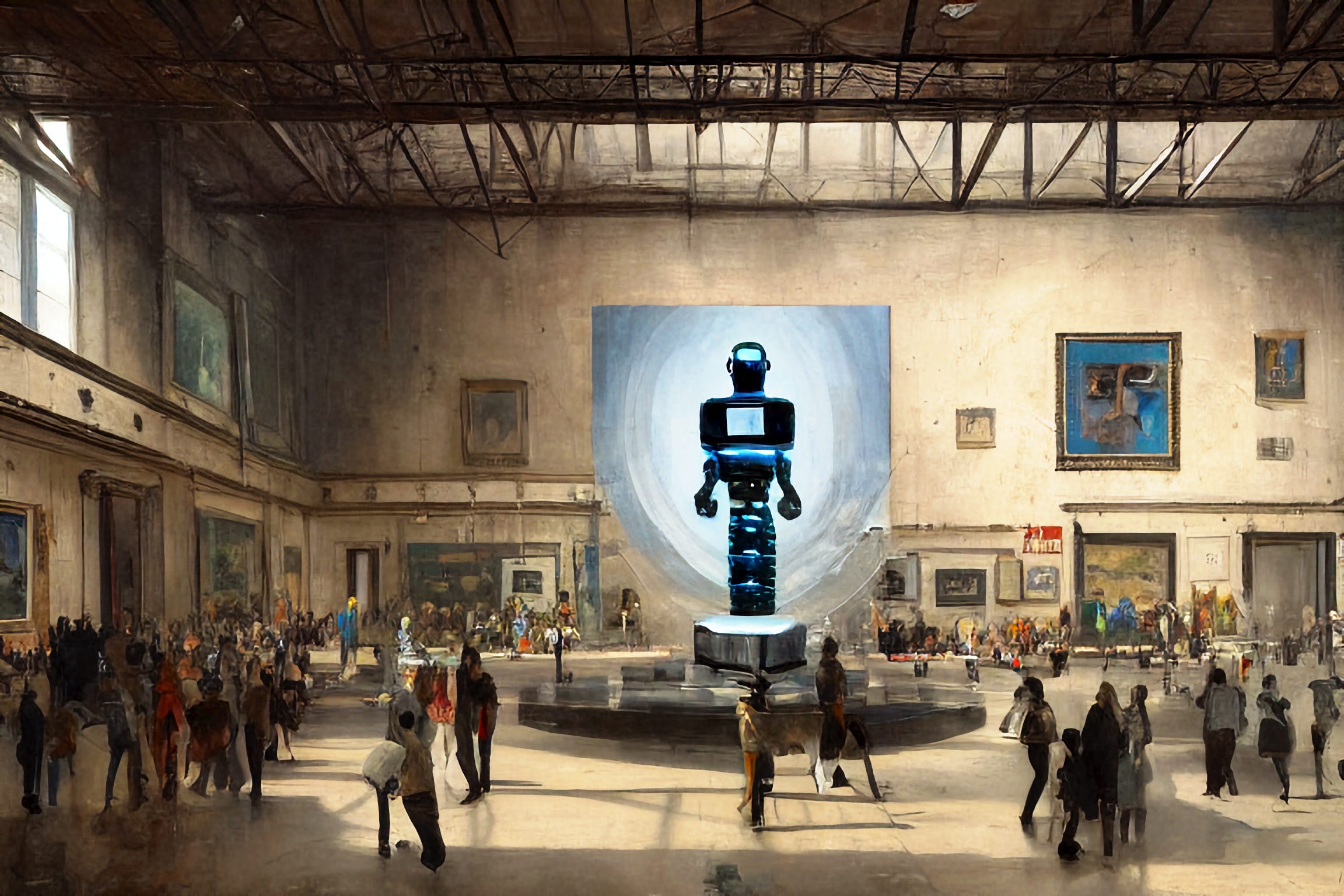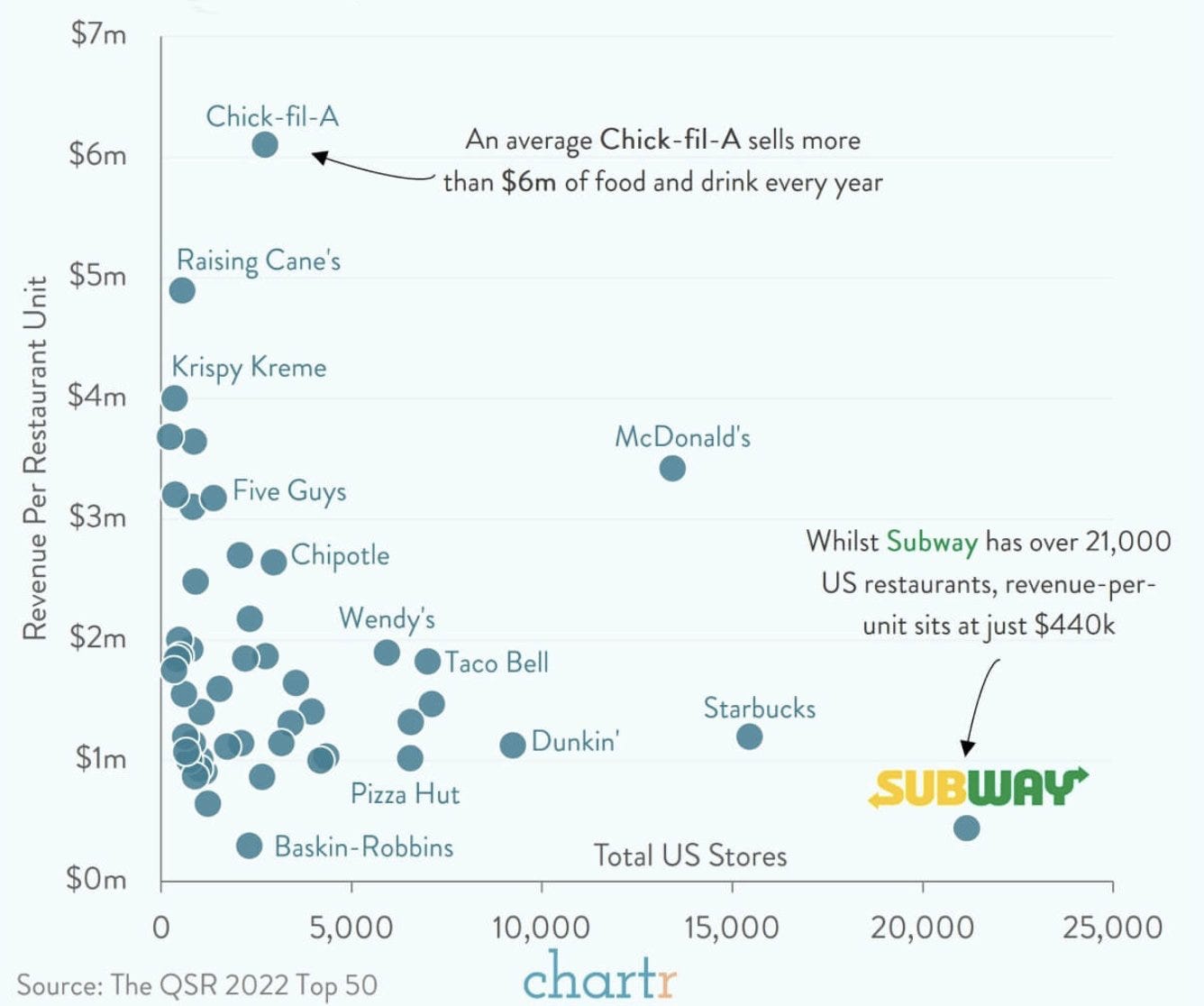376: My Human+Machine AI Art Dream, Microsoft + AI Clippy, Google Bureaucracy, Cloudflare, Nuclear Weapons, and Sideways
"a kind of giant human-AI-robot cyborg organism"
The race is not always to the swift nor the battle to the strong, but that’s the way to bet. -Damon Runyon
🤔💭🖼️🎨🦾🤖🎙️ I have an idea for a human-machine art exhibition that I can’t get out of my head. It’s just so interesting to me, if I had the financial and technical resources, it’s the kind of thing I wish I could make happen someday.
Note: I made all the images with StableDiffusion. They aren’t *exactly* what I have in mind, but they should convey some of the flavor.
The technical foundation for this exhibition is a mix of voice-to-text, Large Language Models (LLMs), generative AI, and robotics.
It begins with a big exhibition hall in a museum, airy and well-lit. At the entrance, a sign explains everything.
In the room, there are soundproof booths with microphones where people are encouraged to go contribute a story that is important to them, an important moment in their life, a meaningful dream, or whatever. At the end of the recording, you can — if you want — get a printout of the random ID of that recording (which will be useful later, more below).
A large language model (LLM) AI will randomly pick stories and use them as seeds to be transformed into visually interesting descriptions of scenes (and anonymize them by removing names and such, if necessary). You could even combine multiple seeds to create even more interesting scenes, etc.
These would then be fed into a generative AI model to create many variations of images based on those booth recording seeds. (something like StableDiffusion or Midjourney)
These would be shown on large touch screens around the room, and anyone could “vote” for their favorites by tapping them on the touch screen (or maybe scanning a QR code under each with their phones to prevent multiple votes, whatever works — you could also have wide lens cameras keeping track of who has voted, kinda like those Amazon Go stores full of sensors).
At the end of a voting round, a winning image is selected and a multi-armed robot inside a large plexiglass cube in the center of the room paints it on a large canvas using regular artist brushes and paint (the robot doesn’t have to be humanoid — it can be just a bunch of industrial robot arms like those that are welding cars together in factories).
Once a painting is complete, it dries and is hung on the walls in room #2 where people can go see the exposition that is being created in real-time over days and weeks by visitors sharing things in the recording booths.
Every painting will also be added to the exposition’s website, so anyone who contributed a story and has kept the ID receipt can look it up and see if their scene has been painted.
I would love to visit such an exhibit, to feel part of it, to add my little story to the DNA of a living exhibition where people and machines make art together in this beautifully convoluted way.
It would be a kind of giant human-AI-robot cyborg organism, if one were to zoom out and look at the entire system. Humanity merging with its tools to create art.
🛀 💡😬 It's often the case that when you learn a lesson about something is the exact worst time to try to apply that lesson, and by the time it's the correct time, it's been long enough that you’ve forgotten the lessons ¯\_(ツ)_/¯
🗣️ 👦🏻👦🏼 I’ve gotten into the habit of asking my kids “what are you forgetting?” instead of telling them exactly what I mean (turn off the lights, bring your plate to the kitchen, put on your mittens).
It may seem like a small thing, but I think it will matter over time.
Doing the thinking creates those pathways and gets them used to thinking about such things in general, creating memory triggers.
It’s a nice theory anyway. I hope it works, because I’m tired of repeating myself!
💚 🥃 🐇 This is the free edition of Liberty’s Highlights with 14,400+ subscribers.
You can get 2 extra editions/week full of juicy stuff + access to the private Discord 🗣🗣🗣 community by becoming a paid supporter (it’s quick & easy).
Paid posts since last week 🐇:
It’s been an AI week, with lots of analysis and speculation on OpenAI, Large Language Models, and the weird Microsoft deal.
I rarely think that, but after publishing this edition, I thought to myself that this one was particularly good. There are multiple sections that I really like, most of them on potential future AI use cases and problems.
If you click the links above, you can see the intros for free and there’s a link to get a 7-day free trial of the paid version. What have you got to lose?
🏦 💰 Liberty Capital 💳 💴
🤖📥📂🗒️📑📇 GPT’s natural home is not a search engine, it’s Microsoft Office (aka Clippy that doesn’t suck 👀📎)
I think we’re all obsessed with the interplay of AI models and search engines because Google is the brightest star in the constellation and has a lot of mind share.
But I think the most logical area where these models are going to make a big splash before search are places where we do a lot of creative stuff (and I don’t just mean write the great American novel — creative in the broadest sense of the word, in a value-neutral way).
Where do most people create a lot of written and visual stuff?
Word, PowerPoint, Outlook… They could all use a Clippy that doesn’t suck.
Photoshop, Illustrator, Figma, and other Adobe programs, along with similar ones by other companies.
Programming IDEs will also keep getting more AI juice (Github Copilot is at forefront, but more is coming). MSFT 0.00%↑ ADBE 0.00%↑
🗄️🗄️ A former employee writes about bureaucracy at Google 🗄️🗄️ 📑🖇️
As Google has swelled in size to over 186,000 workers, many of its employees and even its CEO have complained that the company has become too slow, too bureaucratic, and not productive enough. [...]
"Google is a place that prides itself on moving quickly to tackle world-scale problems," Alex Komoroske, a former Google program manager who worked across products including Chrome and Maps, wrote. "But more recently it's started to feel way, way slower. Accomplishing even seemingly simple things seems to take forever."
The presentation titled "Why everything is so darn hard at Google," posited that Google's size and bottom-up organizational structure have caused it to slow dramatically in recent years. Komoroske believes the root of the problem is all about what he calls the "hidden force." [...]
"Google is basically a slime mold," Komoroske wrote, placing Google on a sliding scale from top-down to bottom-up structures. Komoroske said Google stands out by being further toward the bottom-up end of the scale. [...]
Komoroske said that a slime mold "can do amazing things" by creating more value than the sum of its parts. At the same time, the larger this type of organization grows, the more processes can slow down because many parts act independently, leading to "messy" behavior that can be "hard to predict" and control. [...]
Komoroske suggested there's no easy solution to the problem, but wrote that it's something companies shouldn't ignore.
A generic version of the presentation can be found on Komoroske’s blog. It’s a lot of slides, but he explains things very clearly.
I recommend it to better understand why scaling is such a challenge, and why lots of little frictions can have such a huge impact on output. GOOG 0.00%↑
🇺🇸 The forgotten monetary cost of nuclear weapons 💣💸
We don't talk about the dollar costs of nuclear weapons enough.
US total spending on nukes is equal to [1/3] of all US debt. Or 1,000 Apollo Programs (in today's dollars). Or 5,000 times the cost of the Manhattan Project (also in today's dollars). Or the entire world GDP in 1954.I get it.
As much as I wish that all nuclear weapons would be eradicated and never re-appear, in a world where tyrants have them (Stalin, Putin, Kim Jong-Un), you probably also need them for deterrence (ask Ukraine about this. They gave up their hundreds of nuclear warheads with the Budapest Memorandum in 1994 in exchange for “security assurances” from Russia, the UK, and the USA…).
Anyway, I can’t help but think that there’s a large gap between enough for deterrence and what the US built.
What could have been funded with all these “Apollo” and “Manhattan” projects? Even just building a few hundred civilian nuclear power plants to fully clean up the US grid would’ve been nice, with plenty left over for other things.
Source of the numbers on nuclear weapons.
🍔🍟 Fast food: Number of stores and average revenue per store 🌯🍕
As Sleepwell Cap points out:
Chik-Fil-A even more impressive given they have 14% less selling days... (closed on Sundays)I wish they came to Canada, I've never tried their food.
Via Chartr
🔐 Cloudflare Expands Partnership with Microsoft on Zero Trust Security 🌥️🤝☁️
A bunch of new integrations into Azure Active Directory and such were announced, making it easier for MS customers to get Cloudflare products with less friction.
It is particularly noteworthy because Microsoft has such a large security business — it is commendable that they are not always attempting to do everything themselves, and are willing to collaborate and benefit from both sides.
mutual customers can seamlessly deploy Zero Trust security tools in minutes, with no complex code changes, and add industry-first features, such as Cloudflare’s Remote Browser Isolation technology.
This isn’t a blockbuster deal or anything, but it’s nice blocking & tackling.
Microsoft takes advantage of its distribution capabilities and Cloudflare makes it easier to purchase its products. A win-win situation. NET 0.00%↑
🗣️ Interview: Mostly Borrowed Ideas (MBI)
My friend MBI (💎🐕) did a very in-depth interview retelling his story from the start, including the trials and tribulations of the past few years. I recommend it:
A highlight that I totally agree with:
I started writing on Twitter with my pseudonym, Mostly Borrowed Ideas (MBI). The great thing about writing under a pseudonym is nobody has any idea who you are. Obviously, I divulged my identity later. But at that time, I was anonymous. Nobody had any idea whether I'm just a random guy from Bangladesh or a hedge fund manager managing a couple of billions of dollars. When you don't have your identity revealed, people are forced to evaluate you based on your work rather than where you are from, your background, what you do, etc. And that is extremely powerful. [...]
Nobody's going to follow you because you went to Harvard. People follow you because they like your content, your ideas, or what you have done.
I also like this:
“I want to take my work seriously. But I don't want to take myself seriously."
🔥
🇮🇳 Fairfax India 🛫
Friend-of-the-show Trevor Scott loves Fairfax India.
I don’t have sufficient knowledge about India to assess it as a possible investment, but it’s a country I’d like to learn more about, given the number of my friends who come from that region.
🧪🔬 Liberty Labs 🧬 🔭
🤖🫳⌨️ Demonstration of ChatGPT’s coding/IT capabilities
This is kind of nerdy, but really powerful stuff.
I think most people who try Cha🫳tGPT and don’t see what the big deal is just haven’t explored the types of questions that can be asked of it.
Speaking of that, a tangent:
*Human* prompt engineering (aka what to tell someone to get them to do what you want them to do) is something that machines will get really good at over time, which is a scary thing.
Social engineering already works, but imagine a LLM being 10,000x better at it than the best con artist ever was… 😬
How much raw material needs to be mined to make enough solar panels and wind turbines? 🌎⛏️
The digital world has accustomed us to exponential curves that require relatively little real-world resources. 📈
I mean, we’re building a bunch more data-centers around the world and laying fiber optics cables that crisscross the bottom of the ocean, but it’s generally not that bad considering how many people are online today vs 20 years ago and what it would take any other industry to service that many more customers.
When we’re talking about replacing most of the world’s electricity-generating infrastructure with renewables, which implies MASSIVE growth in these sources, you have to do the math on what that implies to see what you’re signing up for.
Trust me — I wish this wasn’t the case and things were much simpler — I was a HUGE fan of solar and wind for 15+ years. But I kept learning, and physics cannot be denied. With more facts, I *had* to cool down my enthusiasm, because they’re just not as good a deal as many claim.
Part of this is the raw materials required.
There’s a very in-depth report by the Geological Survey of Finland that looks into this. It’s a thousand pages, and I haven’t read all of it, but here are a few great summaries, including with the primary author.
First, a short 7-minute overview of the issues:
Next, a podcast with the author that goes into a fair amount of detail:
And next a detailed presentation of the data by the author:
What most people forget is that mining is very energy-intensive. Crushing rocks isn’t exactly easy…
They also seem to forget that we’ll need to replace every solar panel and wind turbine every 20-30 years, and that especially for solar panels, recycling isn’t realistic (when you look into how much energy you’d have to put in to separate the various materials and do anything useful with them, it simply doesn’t make sense and makes the lifetime energy balance of PV look even worse — we’re more likely to end up with millions of solar panels in landfills).
Modern composite turbine blades are also not really recyclable either, unlike the steel in the towers.
🎨 🎭 Liberty Studio 👩🎨 🎥
🍷🍇🏌️♂️ Sideways (2004)
I recently listened to the Rewatchables episode about this film, and it made me realize that I’m overdue to rewatch it. I haven’t seen it since it came out, but I remember liking it a lot.
Maya: I like to think about the life of wine. How it's a living thing. I like to think about what was going on the year the grapes were growing; how the sun was shining; if it rained.
I like to think about all the people who tended and picked the grapes. And if it's an old wine, how many of them must be dead by now. I like how wine continues to evolve, like if I opened a bottle of wine today it would taste different than if I'd opened it on any other day, because a bottle of wine is actually alive.
And it's constantly evolving and gaining complexity. That is, until it peaks, like your '61. And then it begins its steady, inevitable decline.It may be almost enough to make me start drinking wine. Maybe.












love love love the museum idea. I spent a little time trying to figure out how to have a rolling crowdsourced-picked pile of AI art scroll at all times on a big wall-mounted TV as one of my home art-pieces, but doesnt seem ez enough yet... I dont want to have to download and save pics all the time, I just want great ones constantly beamed in.
Immersive van gogh was excellent
meo wolf in vegas looks cool
one day we'll go to one from an anon artist - and maybe it'll be yours!